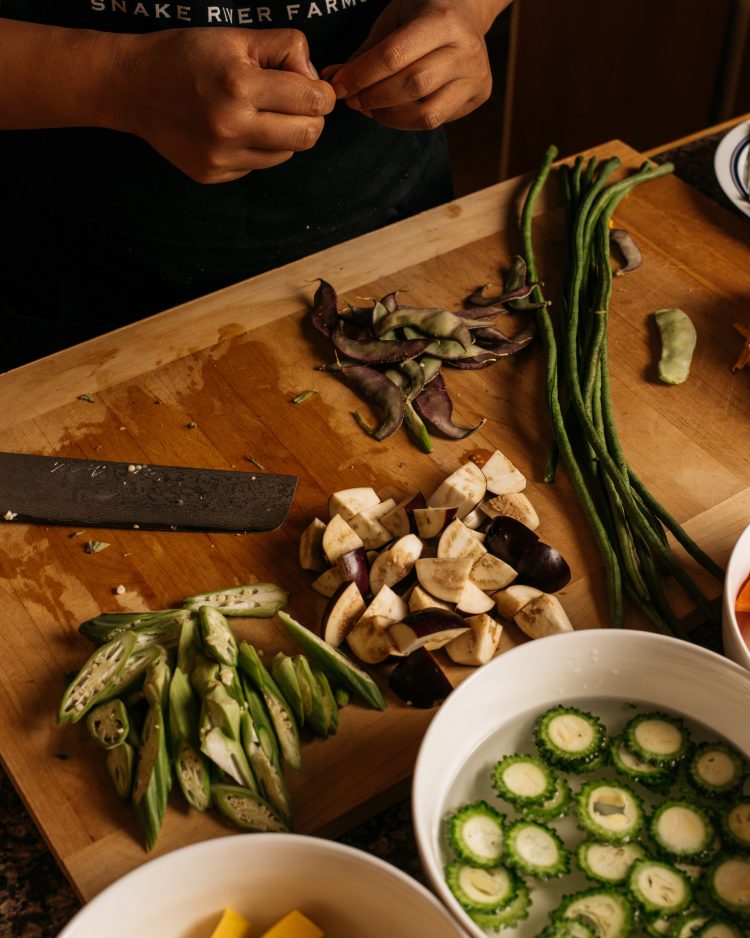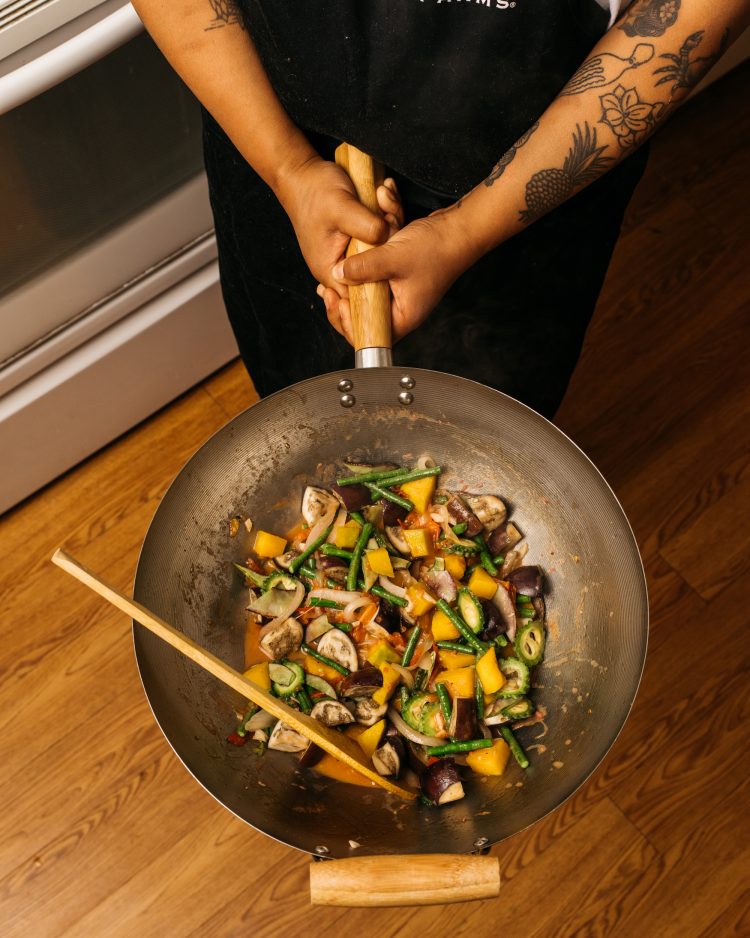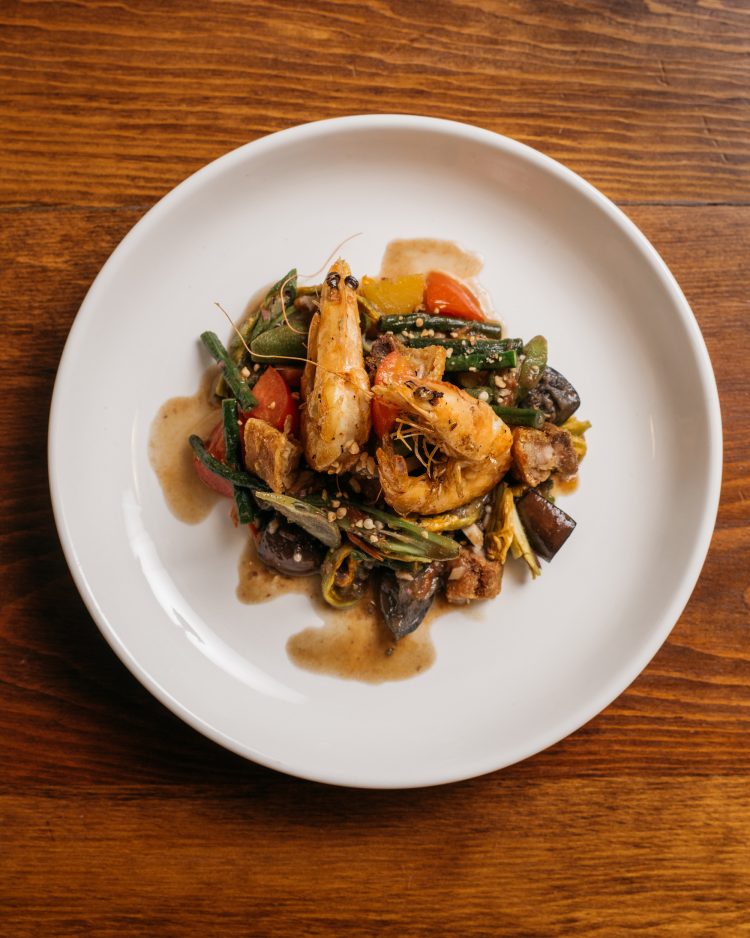What it’s like
to have dinner
with Seattle chef
Melissa Miranda
What it’s like
to have dinner
with Seattle chef
Melissa Miranda
What it’s like to have dinner with Seattle chef Melissa Miranda
At Musang, her new Beacon Hill restaurant, Miranda gives Seattle a taste of what the Philippines means to her.
Edited by Quinn Russell Brown | Photos by Kyle Johnson | September 23, 2019
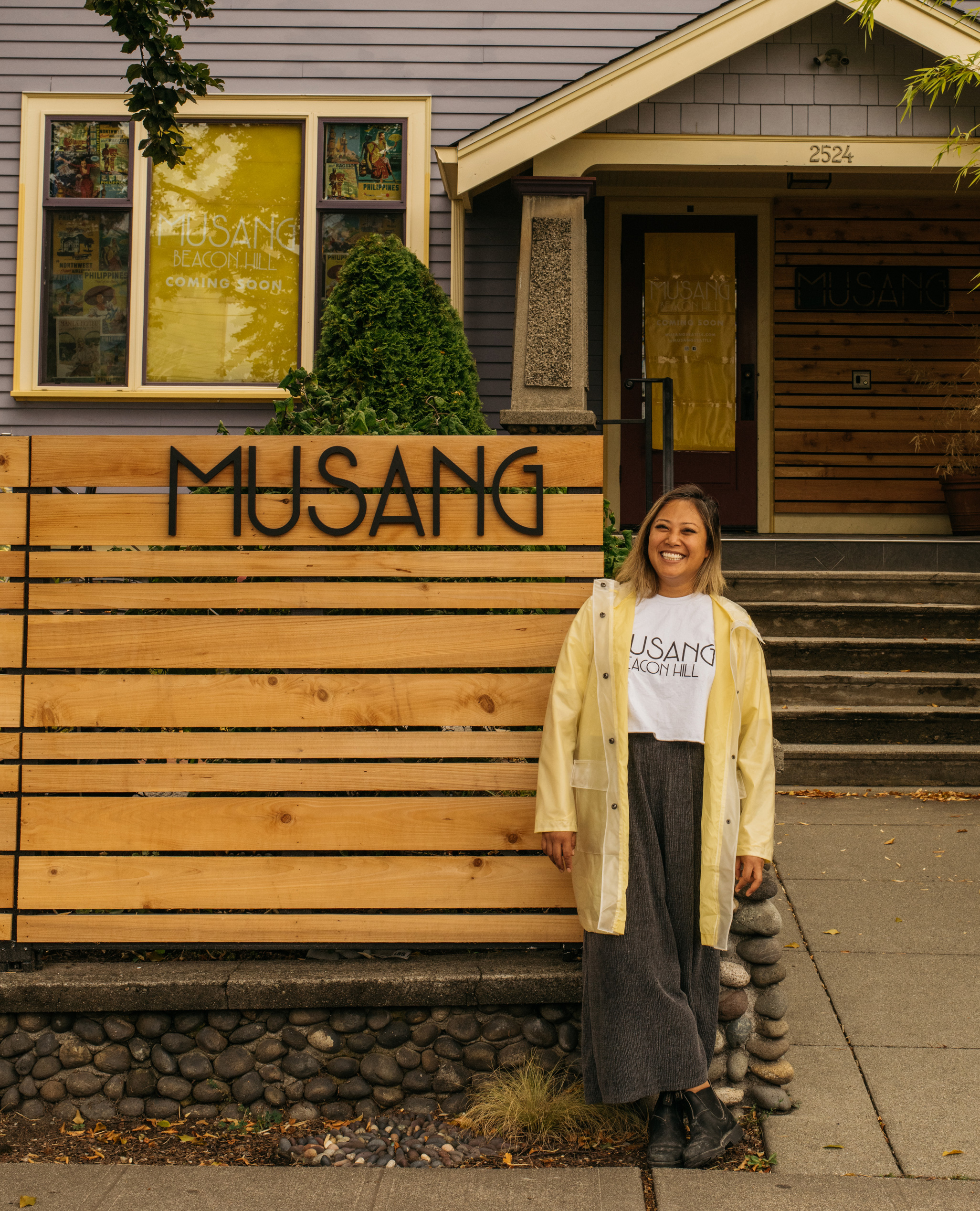
This is part of our Filipino Food Guide, which is a digital addition to our story on the restaurant Archipelago in our September 2019 issue.
Melissa Miranda never planned to be a chef. After graduating in 2007, the sociology major moved to Italy to teach English. She noticed that the flavor profile of Italian food was similar to the Filipino cuisine she grew up eating, and she began to experiment.
A decade of working in kitchens later, Miranda has become renowned for her pop-ups—some of which blended Italian with Filipino—and she’s raised over $90,000 on Kickstarter to open her own Filipino restaurant, Musang, this fall.
We went to Miranda’s home on Beacon Hill for a conversation about food, Filipino identity and the future. We were joined by her neighbor and fellow Filipino-American Jason Ramos, a mortgage loan officer in Seattle. Ramos invested in Musang’s Kickstarter and went to culinary school in a past life.
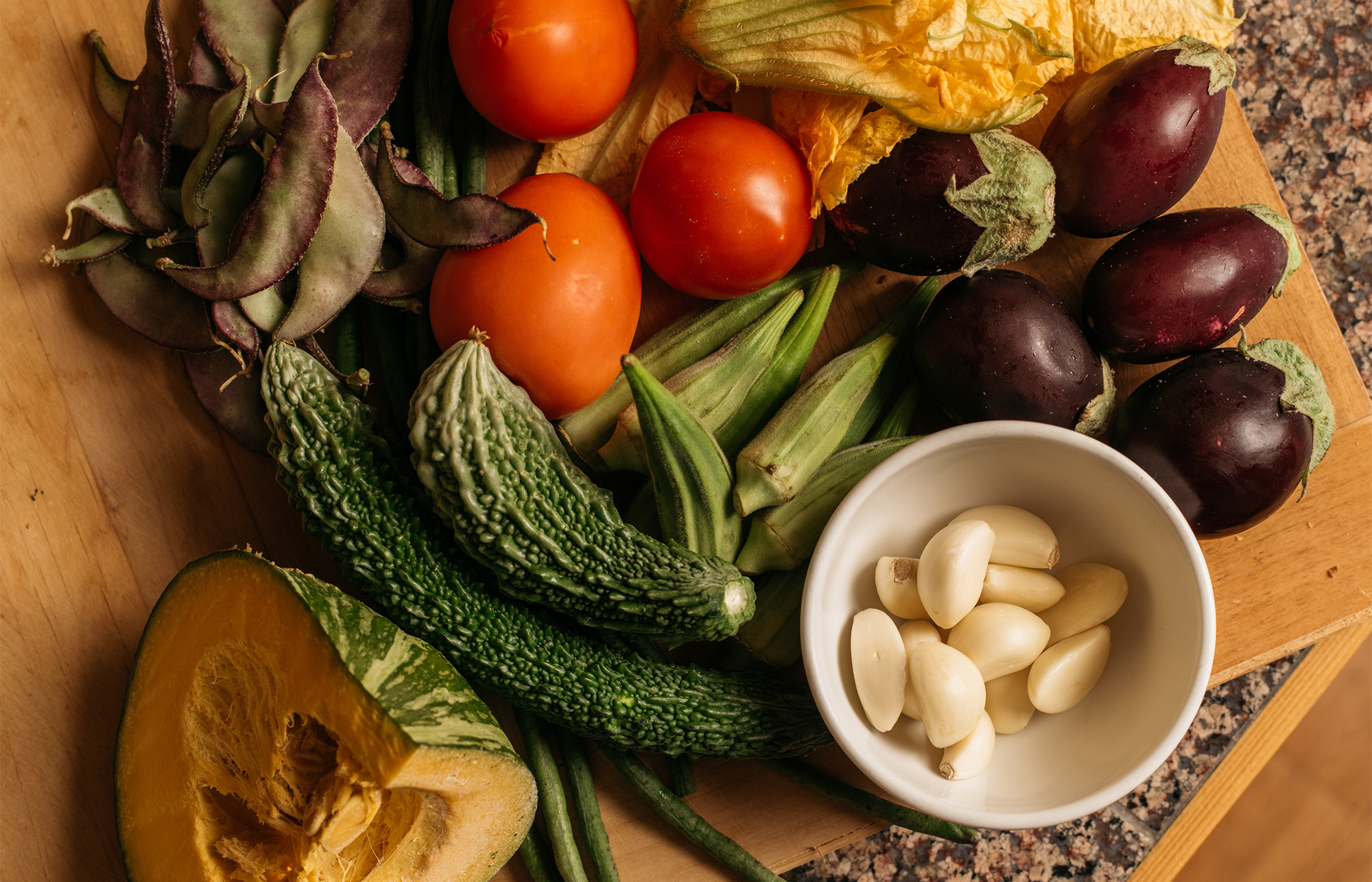
Miranda, who we’ll call “Mel” at the dinner table, brings out three dishes she has prepared: a plate of garlic fried rice, a bowl of beef stew, and a bowl of roasted mushrooms. She points to the mushrooms, which are coated yellow with oily turmeric and topped with green onion.
Mel: This is a spin on ginataan, a coconut-based dish usually made with shrimp, meat or vegetables. The mushrooms have been roasted, lightly pickled in vinegar and held in annatto oil. At Musang, we’re trying to showcase vegetables in a Filipino flavor. A lot of the dishes we do are seasonal and won’t have meat. Filipino always has pork, chicken…
Jason: Always. It’s protein-heavy. I don’t cook a lot of Filipino, but you’re talking about something that’s prevalent in the community. Yes, Filipino has a lot of vegetables, but unless your grandma is cooking, they’re not going to show up on the table.
Mel: It’s hard when you’re facing aunts and uncles, titas and titos, who have strong ideas about what Filipino food should look like and taste like. At Musang, we’ve never said we’re trying to recreate Filipino food. These are interpretations of our childhood. In doing this, I’ll be able to create something that will bring you back to when you were a child.
Mel points to the plate of garlic fried rice, which is topped with clusters of crispy rice that hardened at the bottom of the pan.
Mel: This dish will remind you of when you were at your grandma’s house. And when your grandma eats it she will think, “I just got taken back to when I was five.” And if you’re not Filipino, you’re creating a new memory. For me, it’s important to have this bottom crust. That’s the best piece.
Jason: When you bring this out? I have goosebumps just talking about it, because it’s my childhood. My grandma, with the pot that’s all worn out, and the rice is sticking to the bottom. Teflon? Are you kidding me? There’s no Teflon here!
Mel: You cook it with garlic, and it’s important that you brown the garlic. I like to use Johnny’s Seasoning (laughs). It’s a game changer. This dish is great for breakfast, lunch, dinner. Usually with a fried egg and a protein for breakfast.
Jason: I wouldn’t even try to make this at home, because I can’t recreate it like you did. That’s probably the closest thing I’ll get to my grandmother’s, so to know that we’re getting Filipino on Beacon Hill makes me so happy.
Mel: “Musang” is my dad’s nickname. He used to drive a Mustang and the “t” fell off. So people started calling him Musang. (Editor’s note: Musang means “wild cat” in Tagalog.) The first time I took him to the space and he saw his name on the fence, I cried so hard. As a child of an immigrant parent, you feel the sacrifices and the choices they have made for you to have the life you have. When you talk about legacy, that was a moment for me to reflect, to be proud, because everything that he worked hard for, I am able to honor. Not just for him, but for our culture, our history, our food—a way to keep it going.
View this post on Instagram
Mel points to the beef stew, which is brimming with tomatoes, potatoes and carrots.
Mel: Over here we have mechado, with beef that’s been marinated in fish sauce and soy sauce and stewed with tomatoes. And then we roasted the carrots and potatoes separately to layer the flavors.
Jason: I haven’t had this in a long time!
Mel: Mechado is Spanish, so we have those influences.
Jason: The tomato, the onion—that’s a Spanish base.
Mel: We hope Musang is an educational experience. A lot of people have no idea what Filipino food is. If you had a Filipino friend, then you had adobo, lumpia, pancit…
Jason: The trifecta.
Mel: The trifecta. With Musang’s menu, we might do iterations of that sometimes, but this is a blank slate for us to showcase what we cook. Seafood. Seasonal. Simple. I lived in Italy for a long time, so my philosophy is that simple is better.
Jason: Even when my family gets together the three major times a year, no one’s making this dish. When I taste it, I taste my mother’s mechado.
“When you go to a Filipino house, the joke is that it doesn’t matter if you just ate—you’re still hungry, you’re gonna eat some more. Because that’s your heart being open.”
Jason Ramos
Above: Mel shows how she makes pinakbet, a vegetable stew, with produce sourced from Filipino farmers in Wapato, Washington. She serves it with pork belly and sautéed shrimp. Alas, it’s not on tonight’s menu.
Mel passes around jars of pickled vegetables: one has yellow and green wax beans with ginger and garlic in rice wine, and a second, sweeter jar has roasted pieces of pattypan squash and fennel floating in rice wine vinegar.
Mel: Our staff is just having fun these days, pickling things. We have an apple tree outside of Musang, so we’re going to make apple ketchup.
Jason: Cooking wasn’t something you thought about when you were a kid?
Mel: I always liked it. I liked the aspect of Filipino hospitality. But you know Filipino culture. Being a cook? My dad was like, “You gotta be a computer engineer. Go into the sciences.”
Jason: “An accountant!”
Mel: I have a lot of cousins that don’t actually know how to cook Filipino because their parents shooed them away from the kitchen. My Lola, she was the matriarch of our family, I would always sneak in and watch her cook. So I think there’s something innate in me: I love to cook, it’s not just a job. And this isn’t a chef-driven restaurant, it’s a community-driven restaurant. For us by us. It’s not Chef Mel that’s helming this kitchen. The staff also assumes the Musang identity. I want to create a staff that is recognizable.
Jason: I love that.
Mel: I’m there to mentor, to lead, to be an example. Yes, the food is important, but at the end of the meal, I want you to say, “God, I felt like I was at someone’s home.”
Jason: When you go to a Filipino house, the joke is that it doesn’t matter if you just ate—you’re still hungry, you’re gonna eat some more. Because that’s your heart being open. That’s why food was so important to me as a kid: Being with my grandma at Christmas, making puto, the steamed rice cakes. My memories of food are very important and I hold them dear to my heart as people pass.
Mel: Our food is going to be served family-style at Musang. There’s a sense of ease and familiarity to that. And we’re going to have an open kitchen.
Jason: You made such a name for yourself with the pop-ups. I have a feeling that once Musang opens, and you settle into your space and get your groove on, we’re going to be talking about James Beard’s Rising Star Chef.
Mel: My vision for Musang has always been about sustainability. I want this place to last more than three years. I want it to be a place my children can go to. If we win an award, awesome. But are we going to be here in five years? That’s more important. This is a neighborhood restaurant. Our price points are going to reflect that. Are we taking reservations? No. Are we doing added gratuity? No. This is a place that is accessible and that also gives value to our food.
“It’s not about making space at the table, because we’ve been at the table. Filipinos have been working our butts off for chefs cooking other people’s cuisine. It’s time to cook our food.”
Chef Melissa Miranda
View this post on Instagram
Jason: Everything I’ve heard today has made me even more excited. Having you open up this place is so much more than you opening a new restaurant on Beacon Hill. Anyone can do that. But there’s something happening right here (points to his heart).
Mel: The thing that I’m most excited about is the sense of pride. There is a sense of pride to be Filipino again, and that has come from food.
Jason: You’re going to make me cry, because that is so true. I struggled with that growing up, and it has taken me a long time to learn to love myself. It’s been a very long journey. This is so much more than you just bringing a restaurant here. There’s a lot of s—t behind it that people can’t see. As a Filipino who has learned to love myself, this is one of the most exciting things that is happening here.
Mel: When we talk about pride, we are reclaiming it. We are giving value to not just food, but to ourselves, and to our history, and honoring the struggles that our parents went through. And I can talk about my dad a lot, but my mom, she has been my biggest cheerleader. She has been at every single event.
Mel brings out small bowls of pale pink ice cream. It’s salty and sweet with a slight tartness, derived from dried plum (li hing mui).
Mel: We’re going to have rotating ice creams and sorbets. We’ve done a pandan leaf ice cream with coconut strings, and one made of pinipig, which is young rice that’s been pounded and toasted.
Jason: It’s oats-y.
Mel: Yeah, kind of like an oat, kind of granola-y. We steeped it and it became kind of like a porridge.
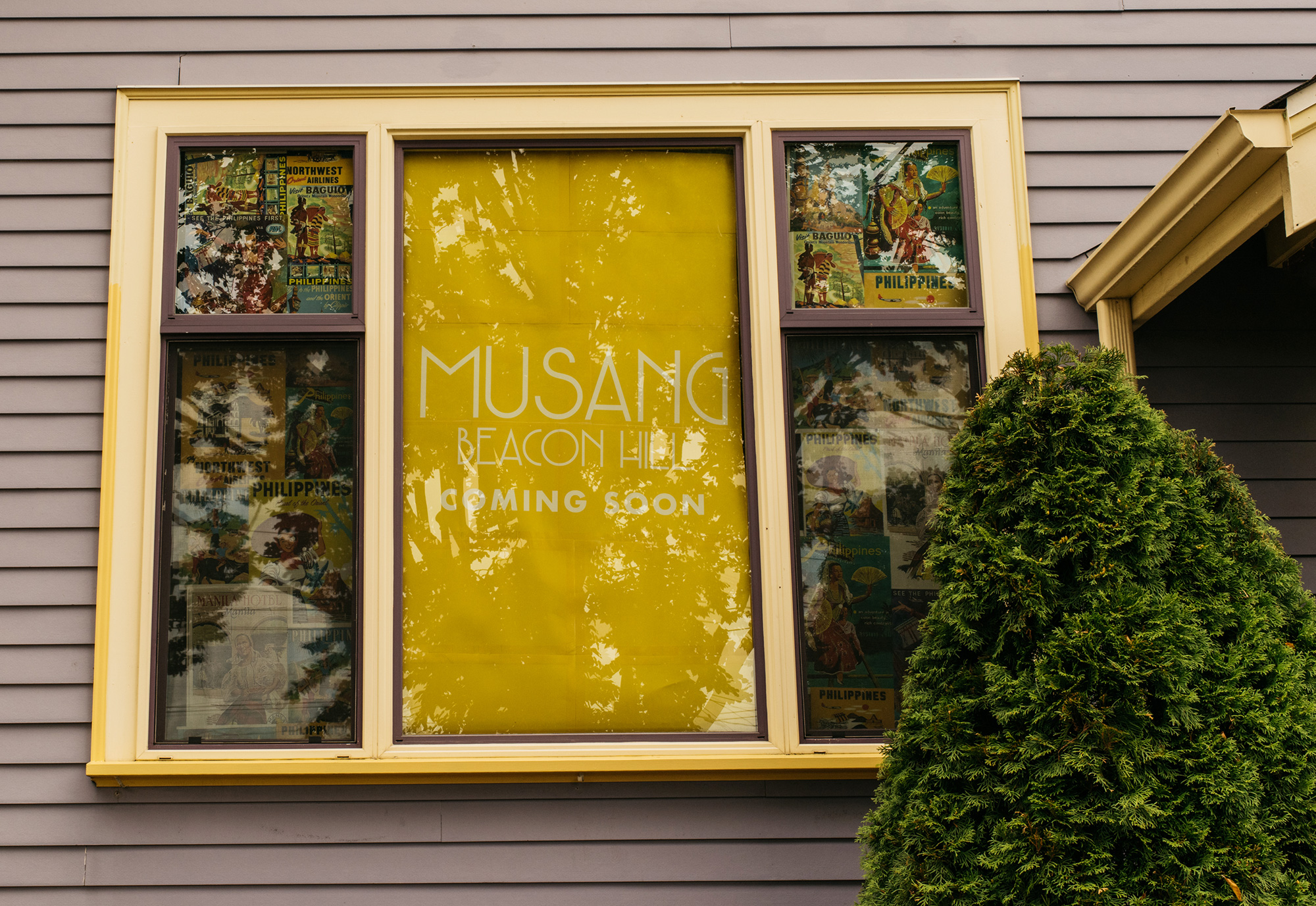
Mel: Because of the colonization that occurred in the Philippines, we were never given a sense of value. Because of that, we never gave value to our food. My mom says this all the time: “I never thought that I would be able to see this happening”—not just Musang, but Filipino food on the map in general.
Jason: I went to culinary school at Johnson & Wales University in Rhode Island. I wanted to cook since I was in third grade, and it’s absolutely shameful of me to think that I didn’t even put value on my own food. That I thought I had to learn technique with another cuisine because I thought that’s what was important. It makes me sad, because as I get older I want to find culture through food. When the family gets together, I need to make something that makes people remember—because they all have memories of food.
Mel: All of us are starting to believe that we can share space, we can take space. It’s not about making space at the table, because we’ve been at the table. We’ve been working our butts off for chefs cooking other people’s cuisine. It’s time to cook our food. Make that noise. Stretch. Flex. It seems like in any system, in any kitchen, there’s a Filipino worker. And they’re killing it.
Jason: I just hope I’m not too late. I feel like I have lost a lot of time. That’s probably part of my shame. It was hard to accept myself as this minority for so long.
Mel: You can unlearn all these things, and heal from the trauma.
Jason: When I hugged you today, it felt like therapy. You are going to be healing people on a level that they aren’t even thinking about, or don’t even know. Everyone has struggle. I think about my mom a lot—her trials that she’s had, I know she’s hidden a lot. Every time food comes out of your kitchen, it’s going to heal someone. That’s why people are going to come back.
Mel: I think what I’ve always been pushing for with Musang is that the customer feels part of it. I want them to feel like they were loved—like they were given a hug with food. It’s important to feed your belly, but we’re all searching for something.
Jason: The food is going to recreate experiences that we’ve all longed for.
As the last bites of ice cream are savored, Mel imagines what it will be like to see her parents walk into Musang for the first time when it’s open to the public.
Mel: As a Filipino child, you only want to make your parents proud. And it’s hard because I know they already feel it, but it’s hard to accept sometimes. I just want them to know that all of this was for them. And not only for them, but for all of our family. I want them to know that their sacrifices were acknowledged, and were paid off, and that there is something that they will be remembered by.
Jason: I am overwhelmed with joy right now. This is going to get me through a lot.
